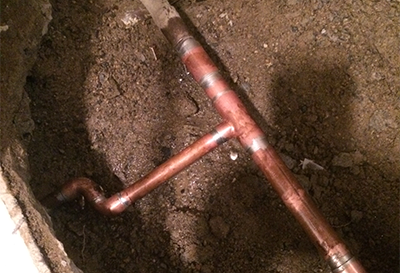We've encountered the article on Finding hidden leaks below on the internet and thought it made perfect sense to discuss it with you on this site.

Early detection of leaking water lines can reduce a prospective catastrophe. Some small water leaks may not be visible.
1. Take A Look At the Water Meter
Every home has a water meter. Examining it is a proven way that aids you uncover leaks. For starters, switch off all the water resources. Ensure nobody will certainly purge, use the faucet, shower, run the washing machine or dishwashing machine. From there, go to the meter and watch if it will alter. Considering that nobody is utilizing it, there ought to be no movements. That indicates a fast-moving leakage if it relocates. If you detect no adjustments, wait an hour or 2 and also examine back again. This suggests you may have a slow-moving leakage that can even be below ground.
2. Inspect Water Intake
Analyze your water costs as well as track your water usage. As the one paying it, you must see if there are any type of discrepancies. If you detect sudden changes, in spite of your consumption being the same, it suggests that you have leakages in your plumbing system. Remember, your water bill should fall under the very same variety each month. An abrupt spike in your expense indicates a fast-moving leakage.
At the same time, a constant boost every month, despite the same routines, reveals you have a slow leakage that's also gradually escalating. Call a plumber to extensively check your home, particularly if you feel a cozy location on your flooring with piping beneath.
3. Do a Food Coloring Test
When it comes to water usage, 30% comes from commodes. If the color somehow infiltrates your dish throughout that time without flushing, there's a leak between the container and dish.
4. Asses Exterior Lines
Don't fail to remember to examine your exterior water lines too. Test spigots by connecting a yard pipe. Needs to water permeate out of the link, you have a loose rubber gasket. Change this and guarantee all links are limited. If you've obtained a lawn sprinkler, it will assist get it professionally analyzed as well as preserved every year. One tiny leakage can throw away tons of water and also increase your water expense.
5. Assess the circumstance as well as examine
Home owners should make it a habit to inspect under the sink counters and also even inside closets for any kind of bad odor or mold growth. These two warnings indicate a leak so punctual attention is needed. Doing routine examinations, also bi-annually, can conserve you from a significant trouble.
Examine for stainings as well as damaging as the majority of pipes as well as devices have a life expectancy. If you suspect leaking water lines in your plumbing system, do not wait for it to rise.
Early discovery of leaking water lines can mitigate a possible disaster. Some tiny water leakages may not be noticeable. Inspecting it is a surefire method that aids you uncover leaks. One tiny leakage can throw away loads of water and surge your water costs.
If you believe leaking water lines in your plumbing system, don't wait for it to intensify.
5 Signs that Your Home Has a Hidden Leak
Your water bill is unusually high without explanation
Generally, your water bill tends to stay consistent throughout the year as long as the same number of people live in your household year round. The bill might be higher during certain times of the year, such as summer, when your lawn may require more watering than it does in cooler months. However, if you notice a rise in your water bill that you can’t explain, it’s an indicator that there’s a hidden leak somewhere in your home.
You hear running water
One of the biggest signs that you have a water leak is the sound of rushing water when no plumbing fixtures are on and when no water-using appliances are running. If you hear running water in your walls when no water is being used anywhere in your home, locate your home’s main water shut-off valve, shut off your water supply, and contact a plumber at once.
Your home smells musty
Hidden leaks often occur in dark spaces, such as behind walls or under carpeting. Incidentally, darkness and moisture can create an ideal breeding environment for mold or mildew. If you start to smell mildew or the scent of rotting wood or stagnant water around your home, it’s a fair bet that a leak is the culprit.
You find wet spots around your home
The wet spots usually show up as moist areas in your carpeting. If your home has a basement level, puddles on the floor could indicate a slab leak. Outside, unexplainable puddles or lush, green patches in your yard often mean that there’s a leak in your sewer line or main water line.
You have stains, bubbles, or condensation on your walls/ceiling
Stains or condensation on your walls or ceiling are both major signs of a hidden leak. Also, drywall (AKA. sheetrock) is very absorbent, and as it takes on more water from a leak behind a wall, it will start to bubble, swell, or warp. If you see this happening in your home, don’t wait to contact a plumber before the water damage spreads.
https://www.ezflowplumbingaz.com/blog/2019/june/5-signs-that-your-home-has-a-hidden-leak/

As a fervent reader about Finding hidden leaks, I imagined sharing that information was important. You should take a moment to distribute this write-up if you enjoyed it. Thank you for your time. Come back soon.
Comments on “6 Ways to Locate Surprise Water Leakages in Your House”